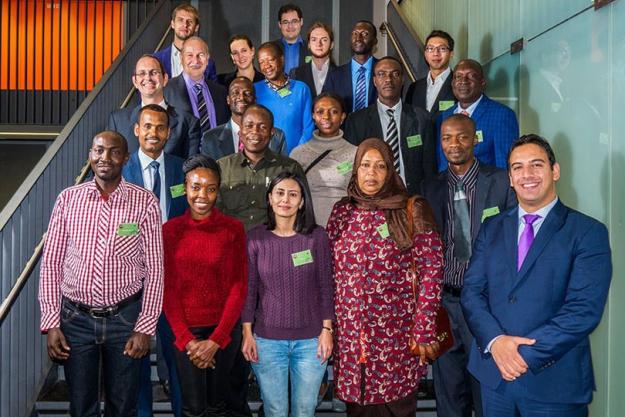
Participants at a Course on Chemical Safety Management for Member States in Africa held in Germany. Photo Credit: Sven Adrian
With the support of the Federal Foreign Office, Government of Germany, the OPCW together with the Bergische Universität Wuppertal (BUW) jointly organised, a course on Chemical Safety Management for Member States in Africa from 12 to 16 October 2015 at the premises of the University. The course accommodated 13 participants from 11 Member States* and was funded through a voluntary contribution from the German Federal Foreign Office.
The topics covered during the training included relevant legislation, risks (both operational and environmental), fire, explosive and toxic hazards, hazard assessment and CBRN protection. The training addressed relevant issues such as process-control engineering, manipulation of protection devices, and safety management. The programme also covered disaster management and emergency response, and risks associated with human factors. In addition, the activities conducted during the course included practical exercises carried out in the Chemical Engineering Department Laboratory of the University and at the mini-plant especially built at the BUW to train the participants. Visits were also undertaken to a chemical plant in the region, AXALTA Coating Systems (formerly DuPont), as well as to the Fire Department of Solingen/Wuppertal.
Participants gained skills on the implementation of modern technical-safety practices and to fulfil their responsibilities to develop sustainable safety management related to the chemical industry. Participants were also encouraged to contribute to the development of a culture of safety in their working environments. Concrete ideas were discussed to enhance their effective contributions to the promotion of chemical safety at the national and regional levels. These ideas included organising subsequent training and information sessions, sensitizing and advising national industries, academia, legislators, as well as including safety aspects in national and regional projects in the Africa region.
* Burundi, Cameroon, Cote d’Ivoire, Ethiopia, Kenya, Nigeria, South Africa, Sudan, Tanzania, Tunisia and Zimbabwe.
